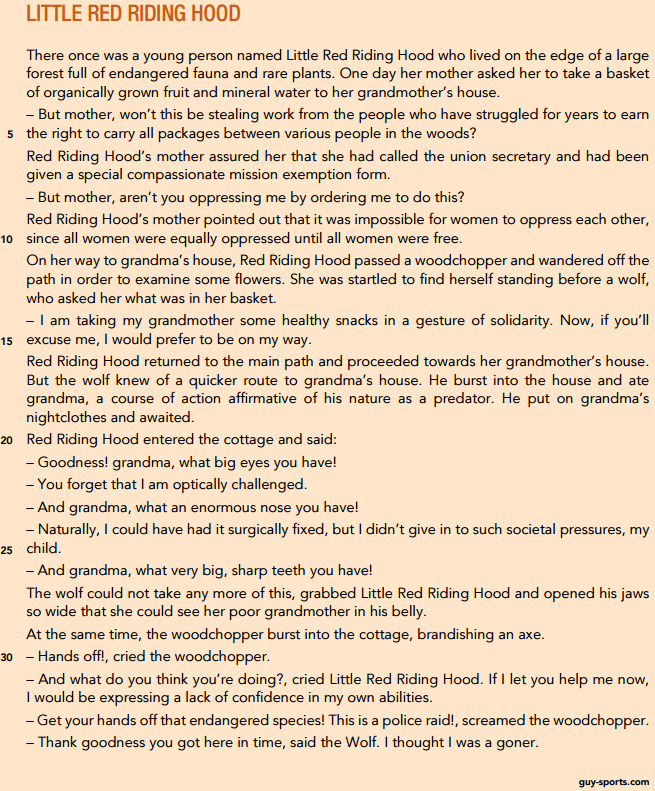Questões de Vestibular
Sobre palavras conectivas | connective words em inglês
Foram encontradas 66 questões
Your gut, your emotions
What controls our emotions? The same two people might see the same tragic newspaper headline, (1) __________ one is much more emotionally affected than the other. Why is that? According to an international team led by UCLA researchers, these emotions may be partially driven by an unlikely source: our gut bacteria. In fact, the bacteria that colonize our intestines may influence the architecture of the brain itself.
The experiment examining the relationship between brain development and the gut microbiome was conducted with mice. Specific strains of mice, one that lacked a complete gut microbiome and one that had a normal microbiome, were compared in terms of their brain development and behavior. The influence of microorganisms is not limited to brain development.
Interestingly, the mice with the ―normal‖ microbiome had more anxiety and moved less than the mice without the microbiome. (2) __________ exposed to a microbiome early in life, the active, calm mice began to act more anxious and reduced their movements. Microbiota evidently had this influence by affecting hormonal expression and building particular pathways in the brain associated with anxiety. The influence on brain development apparently occurred at a particular point early in the mouse‘s life, so it‘s possible early exposure to a proper microbiome is important for normal development. The researchers speculate that the microbiome helps the mice develop an appropriate sense of caution.
The influence of microorganisms is not limited to brain development. (3) __________ no conclusive link has been established, a few studies have detected abnormalities in the gut microbiomes of children with Autism Spectrum Disorders compared to non-affected children. Nor is microorganism influence limited to gut bacteria. A separate study in hyenas (also awaiting conclusive proof) suggests that individual hyenas use a specific cocktail of stinky bacteria in their scent markers left as a message to other hyenas.
(4) __________ some fungus can get in on the act, hijacking ants and forcing the unfortunate insects to relocate to a place favorable for a fungus to grow. The ant does not survive, but it makes great fungus food. (5) __________ a growing body of evidence from other animals, until the UCLA study there was not much direct research on how the microbiome affects humans. But given its potential importance, hopefully there will soon be more research along these lines. Going with your gut, indeed!
Disponível em:< https://daily.jstor.org/your-gut-youremotions/?utm_term=YOUR%20GUT%2C%20YOUR%20EMOTIONS&utm_campaign=jstordaily_08032017&utm_content=e mail&utm_source=Act-On+Software&utm_medium=email>. Acesso em: 15 Set. 2017.
Check the CORRECT alternative.

Nathalie, the swimmer who lost a leg
Nathalie du Toit, the South African swimmer, was only seventeen when she lost her leg in a road accident. She was going to a training session at the swimming pool on her motorbike when a car hit her. Her leg had to be amputated at the knee. At the time she was one of South Africa’s most promising young swimmers. Everybody thought that she would never be able to swim competitively again.
But Nathalie was determined to carry on. She went back into the pool only three months after the accident. And just one year later, at the Commonwalth Games in Manchester, she swam 800 meters in 9 minutes 11:38 seconds and qualified for the final – but not for disabled swimmers, for able-bodied ones! Althought she didn’t win a medal, she still made history.
‘I remember how thrilled I was the first time that I swam after recovering from the operation – it felt like my leg was there. It still does,’ says Nathalie. The water is the gift that gives me back my leg. I’m still the same person I was before the accident. I believe everything happens in life for a reason. You cant go back and change anything. Swimming was my life and still is. My dream is to swim faster than I did before the accident.’
Oxeden, C; KOENIG, C. New English File. Intermediate Student’s Book. OXFORD University Press. (3c-47).
When does the brain work best?
The peak times and ages for learning

What’s your ideal time of the day for brain performance? Surprisingly, the answer to this isn’t as simple as being a morning or a night person. New research has shown that certain times of the day are best for completing specific tasks, and listening to your body’s natural clock may help you to accomplish more in 24 hours.
Science suggests that the best time for our natural peak productivity is late morning. Our body temperatures start to rise just before we wake up in the morning and continue to increase through midday, Steve Kay, a professor of molecular and computational biology at the University of Southern California told The Wall Street Journal. This gradual increase in body temperature means that our working memory, alertness, and concentration also gradually improve, peaking at about mid morning. Our alertness tends to dip after this point, but one study suggested that midday fatigue may actually boost our creative abilities. For a 2011 study, 428 students were asked to solve a series of two types of problems, requiring either analytical or novel thinking. Results showed that their performance on the second type was best at non-peak times of day when they were tired.
As for the age where our brains are at peak condition, science has long held that fluid intelligence, or the ability to think quickly and recall information, peaks at around age 20. However, a 2015 study revealed that peak brain age is far more complicated than previously believed and concluded that there are about 30 subsets of intelligence, all of which peak at different ages for different people. For example, the study found that raw speed in processing information appears to peak around age 18 or 19, then immediately starts to decline, but short-term memory continues to improve until around age 25, and then begins to drop around age 35, Medical Xpress reported. The ability to evaluate other people’s emotional states peaked much later, in the 40s or 50s. In addition, the study suggested that out our vocabulary may peak as late as our 60s’s or 70’s.
Still, while working according to your body’s natural clock may sound helpful, it’s important to remember that these times may differ from person to person. On average, people can be divided into two distinct groups: morning people tend to wake up and go to sleep earlier and to be most productive early in the day. Evening people tend to wake up later, start more slowly and peak in the evening. If being a morning or evening person has been working for you the majority of your life, it may be best to not fix what’s not broken.
(Dana Dovey. www.medicaldaily.com, 08.08.2016. Adaptado.)
– But mother, aren’t you oppressing me by ordering me to do this? (l. 8)
In the sentence above, the word but fulfills the function of:
Leia o texto para responder à questão.
Disparity in life spans of the rich and the poor is growing
Sabrina Tavernise
February 12, 2016

Experts have long known that rich people generally live longer than poor people. But a growing body of data shows a more disturbing pattern: Despite big advances in medicine, technology and education, the longevity gap between high-income and low-income Americans has been widening sharply.
The poor are losing ground not only in income, but also in years of life, the most basic measure of well-being. In the early 1970s, a 60-year-old man in the top half of the earnings ladder could expect to live 1.2 years longer than a man of the same age in the bottom half, according to an analysis by the Social Security Administration. Fast-forward to 2001, and he could expect to live 5.8 years longer than his poorer counterpart.
New research released this month contains even more jarring numbers. Looking at the extreme ends of the income spectrum, economists at the Brookings Institution found that for men born in 1920, there was a six-year difference in life expectancy between the top 10 percent of earners and the bottom 10 percent. For men born in 1950, that difference had more than doubled, to 14 years. For women, the gap grew to 13 years, from 4.7 years. “There has been this huge spreading out,” said Gary Burtless, one of the authors of the study.
The growing chasm is alarming policy makers, and has surfaced in the presidential campaign. During a Democratic debate, Senator Bernie Sanders and Hillary Clinton expressed concern over shortening life spans for some Americans. “This may be the next frontier of the inequality discussion,” said Peter Orszag, a former Obama administration official now at Citigroup, who was among the first to highlight the pattern. The causes are still being investigated, but public health researchers say that deep declines in smoking among the affluent and educated may partly explain the difference.
Overall, according to the Brookings study, life expectancy for the bottom 10 percent of wage earners improved by just 3 percent for men born in 1950 compared with those born in 1920. For the top 10 percent, though, it jumped by about 28 percent. (The researchers used a common measure – life expectancy at age 50 – and included data from 1984 to 2012.)
(www.nytimes.com. Adaptado.)
Leia a charge para responder à questão.

Leia o texto para responder à questão.
Poverty may hinder kids’ brain development, study says
Reduced gray matter, lower test scores reported for poor children
July 20, 2015

Poverty appears to affect the brain development of children, hampering the growth of gray matter and impairing their academic performance, researchers report. Poor children tend to have as much as 10 percent less gray matter in several areas of the brain associated with academic skills, according to a study published July 20 in JAMA Pediatrics. “We used to think of poverty as a ‘social’ issue, but what we are learning now is that it is a biomedical issue that is affecting brain growth,” said senior study author Seth Pollak, a professor of psychology, pediatrics, anthropology and neuroscience at the University of Wisconsin-Madison.
The results could have profound implications for the United States, where low-income students now represent the majority of kids in public schools, the study authors said in background information. Fifty-one percent of public school students came from low-income families in 2013.
Previous studies have shown that children living in poverty tend to perform poorly in school, the authors say. They have markedly lower test scores, and do not go as far in school as their well-off peers.
To see whether this is due to some physical effect that poverty might have on a child’s brain, Pollak and his colleagues analyzed MRI scans of 389 typically developing kids aged 4 to 22, assessing the amount of gray matter in the whole brain as well as the frontal lobe, temporal lobe and hippocampus. “Gray matter contains most of the brain’s neuronal cells,” Pollak said. “In other words, other parts of the brain – like white matter – carry information from one section of the brain to another. But the gray matter is where seeing and hearing, memory, emotions, speech, decision making and self-control occur.”
Children living below 150 percent of the federal poverty level – US$ 36,375 for a family of four – had 3 percent to 4 percent less gray matter in important regions of their brain, compared to the norm, the authors found. Those in families living below the federal poverty level fared even worse, with 8 percent to 10 percent less gray matter in those same brain regions. The federal poverty level in 2015 is US$ 24,250 for a family of four. These same kids scored an average of four to seven points lower on standardized tests, the researchers said.
The team estimated that as much as 20 percent of the gap in test scores could be explained by reduced brain development. A host of poverty-related issues likely contribute to developmental lags in children’s brains, Pollak said. Low-income kids are less likely to get the type of stimulation from their parents and environment that helps the brain grow, he said. For example, they hear fewer new words, and have fewer opportunities to read or play games. Their brain development also can be affected by factors related to impoverishment, such as high stress levels, poor sleep, crowding and poor nutrition, Pollak said.
This study serves as a call to action, given what’s already known about the effects of poverty on child development, said Dr. Joan Luby, a professor of child psychiatry at Washington University School of Medicine in St. Louis. “The thing that’s really important about this study in the context of the broader literature is that there really is enough scientific evidence to take public health action at this point,” said Luby, who wrote an editorial accompanying the study. “Poverty negatively affects brain development, and we also know that early interventions are powerfully effective,” Luby said. “They are more effective than interventions later in life, and they also are cost-effective.”
(www.nlm.nih.gov. Adaptado.)





By Becky Oskin, Senior Writer. Adapted from http://www.
livescience.com/49262-indian-ocean-tsunami-anniversary.
html. December 26, 2014.
INSTRUÇÃO: A questão refere-se ao texto abaixo.
Victoria and Albert: how a royal love changed culture
By Lucinda Hawksley


Disponível em: <http://www.bbc.com/culture/story/20150623-victoria-albert-cultural-impact>.
Acesso em: 3 ago. 15. (Parcial e adaptado.)
I Despite the fact that Victoria and Albert often favoured artists from Germany (linha 30).
II Scottish authors Robert Louis Stevenson and Sir Walter Scott also owe Victoria a debt – in fact, the royal couple’s love of Scotland (linhas 42 e 43).
Genetically modified foods
Genetically modified (GM) foods are foods derived from organisms whose genetic material (DNA) has been modified in a way that does not occur naturally, e.g. through the introduction of a gene from a different organism. Currently available GM foods stem mostly from plants, but in the future foods derived from GM microorganisms or GM animals are likely to be introduced on the market. Most existing genetically modified crops have been developed to improve yield, through the introduction of resistance to plant diseases or of increased tolerance of herbicides.
In the future, genetic modification could be aimed at altering the nutrient content of food, reducing its allergenic potential, or improving the efficiency of food production systems. All GM foods should be assessed before being allowed on the market. FAO/WHO Codex guidelines exist for risk analysis of GM food.
(www.who.int)

Writers of memoirs and life stories never lack an audience. People are interested in the actual lives of others (l. 34-35)
The semantic relationship between the two sentences above can be made explicit by the additon of following connective:








